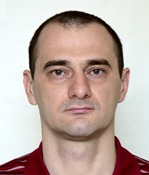Program Information
Stability Analysis of a Novel Dose Calculation Algorithm for MRI Guided Radiotherapy
O Zelyak1*, B Fallone1,2,3 , J St. Aubin1,2 , (1) University of Alberta, Edmonton, AB, (2) Cross Cancer Institute, Edmonton, AB, (3) MagnetTx Oncology Solutions, Edmonton, AB
Presentations
TH-AB-BRA-9 (Thursday, August 4, 2016) 7:30 AM - 9:30 AM Room: Ballroom A
Purpose: To determine the iterative deterministic solution stability of the Linear Boltzmann Transport Equation (LBTE) in the presence of magnetic fields.
Methods: The LBTE with magnetic fields under investigation is derived using a discrete ordinates approach. The stability analysis is performed using analytical and numerical methods. Analytically, the spectral Fourier analysis is used to obtain the convergence rate of the source iteration procedures based on finding the largest eigenvalue of the iterative operator. This eigenvalue is a function of relevant physical parameters, such as magnetic field strength and material properties, and provides essential information about the domain of applicability required for clinically optimal parameter selection and maximum speed of convergence. The analytical results are reinforced by numerical simulations performed using the same discrete ordinates method in angle, and a discontinuous finite element spatial approach.
Results: The spectral radius for the source iteration technique of the time independent transport equation with isotropic and anisotropic scattering centers inside infinite 3D medium is equal to the ratio of differential and total cross sections. The result is confirmed numerically by solving LBTE and is in full agreement with previously published results. The addition of magnetic field reveals that the convergence becomes dependent on the strength of magnetic field, the energy group discretization, and the order of anisotropic expansion.
Conclusion: The source iteration technique for solving the LBTE with magnetic fields with the discrete ordinates method leads to divergent solutions in the limiting cases of small energy discretizations and high magnetic field strengths. Future investigations into non-stationary Krylov subspace techniques as an iterative solver will be performed as this has been shown to produce greater stability than source iteration. Furthermore, a stability analysis of a discontinuous finite element space-angle approach (which has been shown to provide the greatest stability) will also be investigated.
Funding Support, Disclosures, and Conflict of Interest: Dr. B Gino Fallone is a co-founder and CEO of MagnetTx Oncology Solutions (under discussions to license Alberta bi-planar linac MR for commercialization)
Contact Email:

